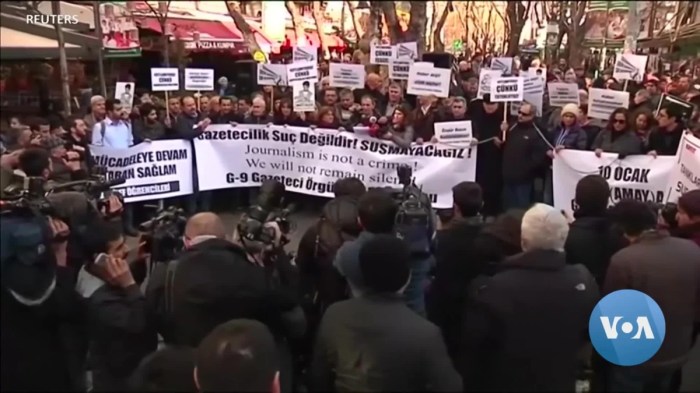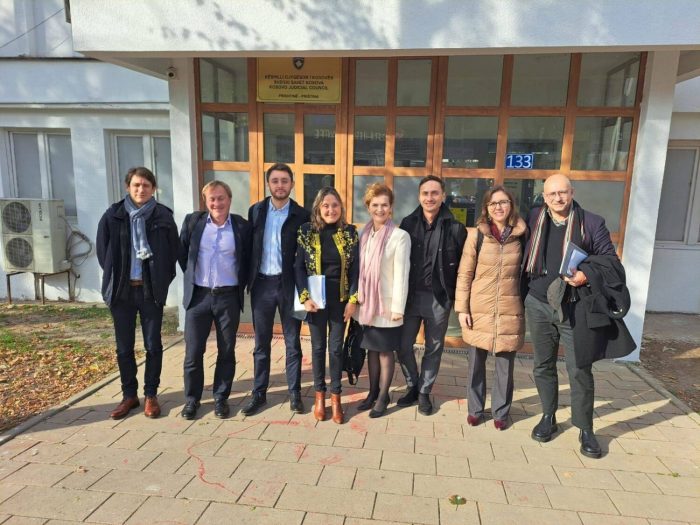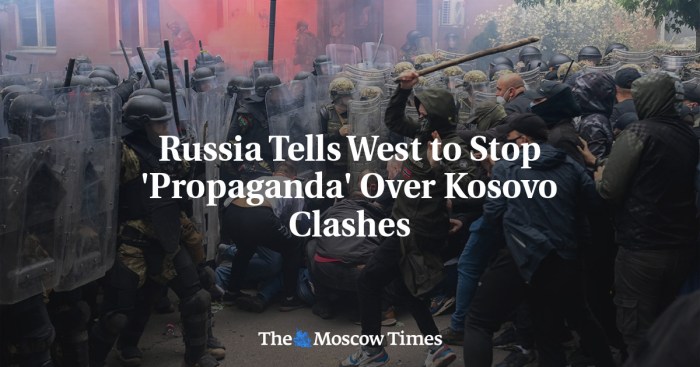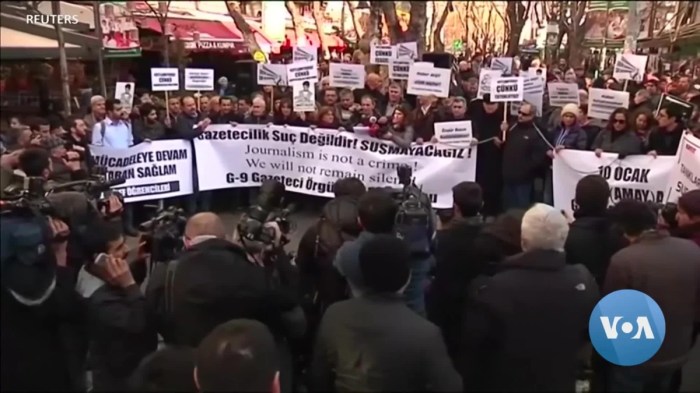
Media Propaganda and Kosovo: Shaping a Nation
Media propaganda and Kosovo are intertwined, shaping public opinion and influencing events in a complex and often controversial manner. From the Kosovo War to the country’s independence, media narratives have played a pivotal role in shaping perceptions both within Kosovo and on the international stage.
This exploration delves into the historical context of media propaganda in Kosovo, examining its impact on public opinion and the international recognition of Kosovo’s independence. We’ll analyze the media landscape in post-independence Kosovo, exploring the challenges faced by independent media and the influence of social media on political discourse.
Finally, we’ll examine the role of media in ethnic relations and political discourse, highlighting its potential to both promote and hinder progress in Kosovo.
Historical Context of Media Propaganda in Kosovo

The Kosovo War (1998-1999) was a brutal conflict marked by widespread atrocities and displacement. Media played a crucial role in shaping public opinion and influencing international intervention. The war provided fertile ground for propaganda, with both sides employing various tactics to sway public sentiment and garner support.
Media Outlets and Narratives During the Kosovo War
The media landscape during the Kosovo War was characterized by diverse narratives and perspectives. International media outlets, particularly those from Western countries, often presented a narrative that emphasized the suffering of Kosovo Albanians and the brutality of Serbian forces. This narrative, while highlighting the human cost of the conflict, also contributed to the perception of Serbia as the aggressor.
- Western Media:Outlets like CNN, BBC, and The New York Times provided extensive coverage of the war, focusing on the humanitarian crisis and the plight of Kosovo Albanians. These reports often featured images and accounts of civilian casualties, displacement, and atrocities committed by Serbian forces.
The media often paints a skewed picture of Kosovo, focusing on conflict and instability. This can lead to misconceptions and prejudices, fueling the narrative of a “war on Islam” that some see in the region. However, it’s crucial to remember that the situation in Kosovo is far more nuanced, and the complexities of its history and identity shouldn’t be reduced to simplistic narratives.
It’s essential to delve deeper into the intricacies of the region and consider alternative perspectives, such as those offered in articles like is it a war on islam , to gain a more balanced understanding of the situation in Kosovo.
This coverage, while aiming to expose the realities of the conflict, also contributed to the demonization of Serbia and the justification for NATO intervention.
- Serbian Media:Serbian media outlets, on the other hand, often presented a different narrative, portraying the conflict as a struggle against Albanian separatism and terrorism. They accused the Kosovo Liberation Army (KLA) of violence and provocations, while downplaying the role of Serbian forces in the conflict.
This narrative aimed to garner support for the Serbian government and delegitimize the KLA.
- International Organizations:Organizations like the United Nations and the Organization for Security and Co-operation in Europe (OSCE) also played a role in shaping media narratives. They released reports and statements documenting human rights violations and war crimes, contributing to the growing international pressure on Serbia.
For instance, the media’s coverage of the Middle East can be equally skewed, often simplifying a multifaceted region into a single, often negative, narrative. More information on the Middle East can be found here, but remember to always be critical of the information you consume.
It’s important to remember that just like with Kosovo, the Middle East is a region with diverse perspectives and experiences, and it’s crucial to seek out multiple viewpoints to form a balanced understanding.
3>Key Figures and Events Shaping the Media Landscape
Several key figures and events significantly shaped the media landscape during the Kosovo War:
- Slobodan Milošević:The Serbian president, Slobodan Milošević, was a central figure in the conflict. His nationalist rhetoric and policies fueled tensions with the Kosovo Albanians, leading to the outbreak of war. Milošević’s media control allowed him to manipulate information and present a distorted view of the conflict to the Serbian public.
- The Račak Massacre:The Račak massacre, where Serbian forces killed 45 Kosovo Albanian civilians, was a pivotal event that galvanized international condemnation and fueled calls for intervention. Images of the massacre, widely circulated by media outlets, served as a powerful symbol of the brutality of the conflict and the need for action.
- NATO Intervention:NATO’s military intervention in Kosovo in 1999, following the failure of diplomatic efforts, significantly influenced media coverage. The bombing campaign, while aimed at halting Serbian aggression, also resulted in civilian casualties and raised concerns about the effectiveness and legitimacy of the intervention.
Media coverage of the intervention reflected these complex perspectives, highlighting both the potential for peace and the dangers of military action.
The Impact of Media Propaganda on Kosovo’s Independence

The quest for Kosovo’s independence was a complex and multifaceted process, and media propaganda played a pivotal role in shaping public opinion, garnering international support, and ultimately influencing the recognition of Kosovo as an independent state. This section delves into the ways in which media narratives from various countries shaped the global perception of Kosovo’s independence, examining the impact of propaganda on international recognition.
Media Narratives and Public Opinion
The media landscape surrounding Kosovo’s independence was characterized by diverse narratives that often reflected the political and historical contexts of individual countries. Pro-independence narratives often emphasized the humanitarian crisis in Kosovo, highlighting the atrocities committed against the Albanian population during the 1999 Kosovo War.
The media’s portrayal of Kosovo has often been shaped by political agendas, creating a complex narrative that’s difficult to untangle. Understanding the role of international justice in such situations requires a deeper dive into the International Criminal Court, which was established to prosecute individuals accused of the most serious crimes of concern to the international community.
While the ICC’s presence can offer a sense of accountability, its limitations and the potential for propaganda manipulation remain crucial considerations when analyzing the Kosovo conflict.
These narratives often portrayed Serbia as the aggressor and Kosovo as the victim, seeking self-determination and protection from Serbian oppression.
“The media played a crucial role in shaping public opinion and international support for Kosovo’s independence by disseminating narratives that highlighted the humanitarian crisis and the need for self-determination.”
Conversely, pro-Serbian narratives frequently presented Kosovo’s independence as a violation of Serbian territorial integrity, portraying the secession as a threat to regional stability and a dangerous precedent for other regions with ethnic tensions. These narratives often emphasized the historical and cultural ties between Kosovo and Serbia, arguing that Kosovo was an integral part of Serbia and that its independence was illegitimate.
International Recognition and Media Influence, Media propaganda and kosovo
The influence of media propaganda on international recognition of Kosovo was significant. The widespread coverage of the Kosovo War and the humanitarian crisis, particularly in Western media outlets, helped galvanize international support for Kosovo’s independence. The images of refugees fleeing violence and the accounts of atrocities committed against Albanians created a sense of urgency and sympathy for the Kosovar cause.
This media coverage played a crucial role in shaping the perception of Kosovo’s independence as a legitimate and necessary step towards peace and stability in the region.The media narratives from different countries also influenced the decisions of individual governments regarding recognition.
For example, countries with strong historical ties to Serbia, such as Russia and China, were more likely to be influenced by pro-Serbian narratives and were less likely to recognize Kosovo’s independence. Conversely, countries with strong historical ties to the West, such as the United States and the United Kingdom, were more likely to be influenced by pro-independence narratives and were more likely to recognize Kosovo’s independence.
Impact on Kosovo’s Post-Independence Development
The media’s role in shaping public opinion and international support for Kosovo’s independence had a lasting impact on the country’s post-independence development. The international recognition, largely influenced by media narratives, provided Kosovo with a platform to establish itself as a sovereign state and to access international aid and support.
However, the media also contributed to the perpetuation of negative stereotypes about Kosovo, often portraying it as a fragile and unstable state. This perception has hindered Kosovo’s economic development and its integration into the international community.
Media Landscape in Post-Independence Kosovo: Media Propaganda And Kosovo
The media landscape in Kosovo has undergone significant transformation since the country’s independence in 2008. The emergence of a free and independent media has been a crucial factor in fostering democratic values and holding the government accountable. However, the media environment in Kosovo remains complex, characterized by a combination of both progress and challenges.
Key Media Outlets and Political Affiliations
The media landscape in Kosovo is dominated by a handful of prominent media outlets, each with varying degrees of political affiliations.
- Kosova Press: This independent daily newspaper is widely regarded as one of the most respected media outlets in Kosovo. It has a reputation for investigative journalism and critical reporting, often focusing on issues of corruption and government accountability.
- Koha Ditore: This daily newspaper is known for its close ties to the Democratic Party of Kosovo (PDK), one of the country’s major political parties. It has been accused of bias in favor of the PDK, but it remains a popular and influential media outlet.
- Zëri: This independent news agency is known for its balanced reporting and its commitment to journalistic ethics. It has been praised for its coverage of sensitive issues, such as human rights and minority rights.
- RTK: This public broadcaster, established in 1999, is funded by the government. While it strives to maintain impartiality, it has faced criticism for its perceived bias in favor of the ruling party.
Challenges Faced by Independent Media
Despite the progress made in establishing a free media, independent journalists in Kosovo face numerous challenges.
- Political Pressure: Political interference in media operations remains a significant concern. Journalists have been subjected to threats, intimidation, and legal harassment for their critical reporting.
- Economic Constraints: The media industry in Kosovo is characterized by limited financial resources. This makes it difficult for independent media outlets to compete with larger, politically connected media organizations.
- Lack of Professional Standards: The absence of strong professional standards and ethical guidelines has contributed to a culture of sensationalism and biased reporting in some media outlets.
Role of Social Media
Social media platforms have become increasingly influential in shaping public opinion and political discourse in Kosovo.
- Rapid Dissemination of Information: Social media platforms enable the rapid dissemination of news and information, often bypassing traditional media outlets.
- Citizen Engagement: Social media has facilitated greater citizen engagement in political debates and discussions, allowing for the expression of diverse perspectives.
- Spread of Misinformation: The decentralized nature of social media platforms has contributed to the spread of misinformation and propaganda, making it challenging to verify the authenticity of information.
The Influence of External Media on Kosovo

Kosovo, a young nation in the Balkans, has experienced a complex and often turbulent history. Its journey towards independence was marked by political turmoil, ethnic tensions, and a long-standing struggle for recognition. In this context, the role of media, both internal and external, has been significant in shaping public opinion, influencing political discourse, and ultimately contributing to the development of Kosovo’s national identity.
The Impact of Media from Neighboring Countries on Kosovo’s Public Opinion
The media landscape in Kosovo is heavily influenced by neighboring countries, particularly Serbia, Albania, and Turkey. These countries have established strong media networks that reach into Kosovo, often presenting different narratives and perspectives on events related to Kosovo. The influence of these media outlets can be significant, particularly in shaping public opinion on issues such as political stability, economic development, and ethnic relations.
- Serbian Media:Serbian media outlets often portray Kosovo in a negative light, emphasizing the historical and cultural ties between Kosovo and Serbia, and highlighting the concerns of the Serbian minority in Kosovo. This often creates tension and fuels anti-Serbian sentiment within Kosovo.
For example, during the 2008 declaration of independence, Serbian media outlets largely condemned the move, depicting it as a threat to Serbian interests and national security. This portrayal further solidified existing tensions and fueled animosity between the two communities.
- Albanian Media:Conversely, Albanian media outlets tend to focus on Kosovo’s cultural and linguistic connections to Albania, often promoting the idea of a unified Albanian identity. This perspective can be viewed as a source of encouragement and solidarity for the Albanian majority in Kosovo.
However, it can also create tensions with other ethnic groups, particularly Serbs, who view it as a form of cultural and political domination.
- Turkish Media:Turkish media outlets have also played a role in shaping public opinion in Kosovo, particularly through their coverage of religious and cultural issues. Turkey has a long history of cultural and religious ties with Kosovo, and Turkish media outlets often highlight these connections, promoting a sense of shared identity and cultural affinity.
This influence is particularly noticeable in Kosovo’s Muslim community, where Turkish media outlets are often seen as a source of information and inspiration.
The Role of International Media Outlets in Shaping the Image of Kosovo
International media outlets have also played a significant role in shaping the image of Kosovo, often providing a broader perspective on the country’s situation and its path to independence. The coverage of Kosovo in international media has been diverse, ranging from reports on the conflict and its aftermath to stories on the country’s cultural heritage, economic potential, and efforts to rebuild its society.
- Western Media:Western media outlets, such as the BBC, CNN, and The New York Times, have generally been supportive of Kosovo’s independence and have often portrayed the country as a victim of Serbian aggression and a symbol of hope for democracy and stability in the Balkans.
Their coverage has been instrumental in raising international awareness about the situation in Kosovo and garnering support for its independence.
- Russian Media:Russian media outlets, on the other hand, have often taken a more critical stance on Kosovo’s independence, portraying it as a violation of international law and a threat to regional stability. Their coverage has been influenced by Russia’s close relationship with Serbia and its opposition to the Western-backed independence of Kosovo.
Comparing and Contrasting the Coverage of Kosovo in Different Media Outlets
The coverage of Kosovo in different media outlets often reflects the political and ideological positions of the respective countries and regions.
- Pro-Independence vs. Pro-Serbia:Media outlets in countries that supported Kosovo’s independence, such as the United States and the European Union, tended to present a more positive image of Kosovo, highlighting its democratic aspirations and its efforts to rebuild after the conflict. Conversely, media outlets in countries that opposed Kosovo’s independence, such as Russia and Serbia, often presented a more negative image of Kosovo, emphasizing its political instability, economic challenges, and the concerns of the Serbian minority.
- Focus on Conflict vs. Focus on Reconstruction:Media outlets that focused on the conflict in Kosovo often emphasized the violence, human rights abuses, and political tensions. This type of coverage can be seen as sensationalistic and can contribute to the perception of Kosovo as a dangerous and unstable country.
Conversely, media outlets that focused on the reconstruction of Kosovo often highlighted the country’s progress in rebuilding its economy, infrastructure, and institutions. This type of coverage can be seen as more optimistic and can contribute to a more positive image of Kosovo.






